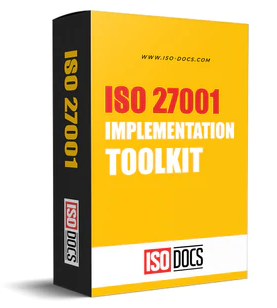ISO 27001 What Is It?
In today's digital age, data breaches and cyberattacks have become all too common, posing a significant threat to organizations of all sizes and industries. Safeguarding sensitive information and maintaining data confidentiality, integrity, and availability has never been more critical.

This is where ISO 27001 comes into play – an internationally recognized standard that provides a structured framework for establishing, implementing, maintaining, and continually improving an Information Security Management System (ISMS).
What is ISO 27001?
A widely accepted Information Security Management Systems (ISMS) standard is ISO 27001. Developed by ISO and IEC, it provides a structured framework for organizations to establish, implement, maintain, and continually improve a systematic approach to managing the security of sensitive information. ISO 27001 helps identify risks, implement appropriate security controls, and ensure data confidentiality, integrity, and availability. It assists organizations in preventing data breaches, complying with regulations, and enhancing their reputation by demonstrating a strong commitment to information security. Achieving ISO 27001 certification validates an organization's efforts to safeguard valuable information assets.
The Importance of ISO 27001
ISO 27001 holds immense importance in today's interconnected and data-driven world. It is a lighthouse guiding organizations through the turbulent waters of information security. One of its primary roles is to provide a structured framework for identifying, assessing, and mitigating risks related to sensitive data. By establishing an Information Security Management System (ISMS) according to ISO 27001 standards, organizations can proactively fortify their defenses against cyber threats, reducing the potential for data breaches and other security incidents.
Beyond risk management, ISO 27001 plays a pivotal role in instilling trust and confidence among stakeholders. With the increasing frequency and severity of data breaches, clients, partners, and customers demand assurance that their information is handled with the utmost care. ISO 27001 certification is tangible evidence of an organization's commitment to safeguarding sensitive data, bolstering its reputation and credibility.
Additionally, ISO 27001 guarantees adherence to intricate data protection and privacy standards. Non-compliance can result in financial penalties, legal ramifications, and reputational harm. Organisations can establish a roadmap to manage this regulatory environment while putting information confidentiality, integrity, and availability first by complying to ISO 27001 standards.
In essence, ISO 27001 is not merely a set of guidelines but a strategic imperative. It empowers organizations to manage risks proactively, foster trust, maintain compliance, and confidently navigate the digital landscape. As technology advances and cyber threats evolve, ISO 27001's significance will only grow, positioning it as a cornerstone of modern information security practices.
Foundational Scope Definition: Components of ISO 27001
- Risk Assessment: A thorough risk assessment identifies potential threats, vulnerabilities, and impacts on information assets. Risks are then evaluated to determine appropriate mitigation strategies.
- Risk Treatment Plan: Organizations develop a plan to address identified risks, selecting and implementing security controls to reduce or eliminate vulnerabilities.
- Information Security Policy: A formal policy sets the tone for the organization's commitment to information security and provides a framework for decision-making.
- Asset Management: Effective management of information assets, including their classification, ownership, and handling procedures, is crucial for maintaining security.
- Human Resources Security: This encompasses background checks, training, and defining roles and responsibilities to ensure employees understand and adhere to security policies.
- Physical and Environmental Security: Security measures must extend beyond digital systems to protect physical assets and environments where information is processed and stored.
ISO 27001 Implementation Process
- Initiation: Obtain buy-in from top management, assign roles and responsibilities, and define the scope of the ISMS.
- Risk Assessment: Identify and assess risks to information assets, considering potential threats, vulnerabilities, and impacts.
- Risk Treatment: Develop and implement security controls to address identified risks, considering cost-effectiveness and feasibility.
- Documentation: Create necessary documentation, including policies, procedures, and guidelines, to support the ISMS.
- Training and Awareness: Educate employees about information security policies, practices, and responsibilities.
- Monitoring and Review: Regularly monitor and review the ISMS's performance, effectiveness, and compliance.
- Continual Improvement: Use feedback and assessment results to identify areas for improvement and implement necessary changes.

Benefits of ISO 27001 Certification
ISO 27001 certification bestows many invaluable benefits upon organizations, positioning it as a cornerstone in information security. The certification is a powerful testament to an organization's dedication to safeguarding sensitive data. This fosters trust and confidence among clients, partners, and stakeholders, enhancing the organization's reputation and credibility.
Furthermore, ISO 27001 offers a well-organized framework for recognising, evaluating, and reducing risks to information assets. By implementing robust security controls and measures, organizations can significantly reduce the likelihood of data breaches and cyberattacks, thus safeguarding their operations and minimizing potential financial and reputational damages.
Certification also ensures compliance with legal and regulatory requirements about data protection and security, shielding organizations from legal penalties and regulatory fines. Additionally, ISO 27001's emphasis on continuous improvement cultivates an environment of proactive vigilance, enabling organizations to stay ahead of emerging threats and challenges in the dynamic landscape of information security.
Conclusion
ISO 27001 serves as a vital benchmark for organizations, offering a comprehensive framework via an Information Security Management System (ISMS). It empowers proactive risk assessment, effective security controls, and safeguarding sensitive information.
Beyond compliance, ISO 27001 signifies a dedication to continuous improvement and readiness against evolving cyber threats. Embracing this standard equips organizations to navigate complex information security challenges and ensure data security in an interconnected world.


